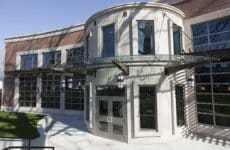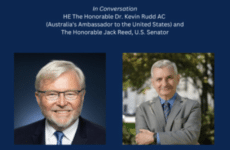By: Mary Grace Donaldson
Posted In: News

Photo credit: Mary Grace Donaldson
Leila de Bruyne of Flying Kites in Newport, R.I. works to raise funds for needy children in Africa in her office on Thames St.
Leila de Bruyne sits at her glass desk at her Thames Street office, surrounded by photos of African children, multiple Mac computers, and two clocks on the wall, one showing the time in Newport and the other showing the time in Nairobi, Kenya. On the right side of the desk rests a half-finished cup of tea and an enormous Poland Spring water bottle. On the left side is a pile of binders with labels such as “FK Leadership Academy” and also De Bruyne’s Blackberry, beeping what feels like every five minutes. At the foot of De Bruyne’s own computer sits a clay sculpture of an African baby. Emails from her colleague and longtime friend, Justine Axelsson, dance across her computer screen in spite of Axelsson sitting three feet away at her own crowded glass desk. Internet radio plays softly in the background.
“Lei, how does this look?” Axelsson asks of her work, contained in the emails. De Bruyne, Axelsson, and a third co-worker, Sara Sturgis, look up from their desks, as Toby Storie-Pugh comes through a side door and asks the room, “Did you eat my tortilla?” The trio erupts into laughter as De Bruyne, Axelsson, and Sturgis are insistent that they had no part in the tortilla thievery. The group’s laughter resounds through the open, multi-windowed office. They eventually return to their work on a fundraiser for Flying Kites, a nonprofit organization that de Bruyne, Axelsson, and Storie-Pugh co-founded in 2007. Their laughter is representative of the group’s chemistry. De Bruyne looks over her flier for an event at Sambar Newport, not normally a part of her daily work duties, as her graphic designer is working on another major project for Flying Kites. Her computer has at least two other tabs open, one of them her email, the second a folder of publicity photos of orphans who live at Flying Kites orphanage in Nairobi. The work is endless, but De Bruyne and her colleagues all attest to having the best jobs that they could possibly have. With exhibition of such passion toward her work, anyone who met De Bruyne would not know that she was not involved in service work until she entered Salve Regina University as a freshman in 2003. After taking an anthropology course titled “Children in a Global Perspective,” De Bruyne gained a growing awareness of the situation in the slums of Kenya. Currently, the Flying Kites organization has both a board of directors and an advisory board. The organization was gifted the Thames Street office and an extensive website. More importantly, it consists of both an orphanage which houses 15 children and the Flying Kites Leadership Academy, made of up of 65 students from the local surrounding village (including the 15 residents). Students from Salve Regina volunteer their time at Flying Kites during the summers. Extensive fundraising programs have been put in place. Most recently, Feinstein Leadership Schools of Rhode Island (founded by Alan Shawn Feinstein) donated $60,000 to Flying Kites to go toward the construction of a new school on their site in Kenya. The school and residences will no longer be housed together, once construction of the school is completed. The ground breaking for the new facility was held on January 10, 2010. These accomplishments would normally sound like someone’s life’s work, yet De Bruyne and her colleagues accomplished a great deal in a very short amount of time. “It was all her idea!” said Storie-Pugh of his colleague and childhood friend. “We don’t have lives now!” As further proof of De Bruyne’s dedication to her work, she has learned to divide her time between Nairobi, Newport, and England, where her family still resides. “I’m not even a good flier!” De Bruyne said of her frequent traveling. “But, I’m always happy to get where I’m going.” When in Nairobi, De Bruyne says the children call her “Auntie,” as is customary in their culture to call an older female visitor “Auntie.” Her favorite activity with the children is reading to them in bed with the aid of a flashlight. She hopes to keep good, strong relationships with the children as they have been betrayed by people whom they’ve trusted. “She literally lights up a room,” said Dr. Debra Curtis, current assistant professor of sociology at Salve Regina who taught “Children in a Global Perspective” and is now a close friend and chairperson of the Flying Kites Board of Directors. Outside of her time in Nairobi, De Bruyne loves to go shopping and go out to dinner in Newport, especially at the Salvation Café. “She’s still a regular girl!” said Curtis of De Bruyne’s life outside Flying Kites. She is not, however, without her own struggles. Just based on her sporting leather cowboy boots and black skinny jeans, it is no secret that De Bruyne enjoys fashion. She often feels guilty about her love for material things, but does not feel that she has to justify it to herself. “In order to make life better, you don’t have to change what you want,” De Bruyne said. De Bruyne was born in Cambridge, England, on May 1, 1984 to John and her namesake Leila de Bruyne Sr. She was the second of five children, with one older sister and two younger sisters and a brother, who are triplets. Her father started the tradition of coming over to the states from Cambridge for a college education, and met De Bruyne’s mother, an American, while they were in college. De Bruyne lived in Cambridge until she was 5 years old and her parents separated. She moved to Greenwich, Connecticut with her mother to be close to her mother’s family who still resides in New York. De Bruyne and her mother left the other four siblings behind in England with their father, the three younger of which, De Bruyne says, did not have a difficult time adjusting to their mother’s and sister’s noticeable absence as they were just infants. At age 11, De Bruyne decided on her own to return to Cambridge to get to know her father. It would be easy to assume that her mother would be distraught, but De Bruyne says that her mother was thrilled about her decision. De Bruyne was never an academic. She never participated in service activities during her elementary and high school years. She attended Saffron Walden County High School in Essex where she graduated in 2003. While the closest that she could come to a career choice was a crossing guard, she says that “looking back, I always wanted to work with children.” Choosing a college was not difficult for De Bruyne as she was intent on going to school in the states as is often customary for high school students in England. She ended up only applying for admission to Salve Regina. She says that was going to apply to Wheaton, but she didn’t wish to attend her mother’s alma mater. She also has an aunt in Marian, Mass. who took her to visit Newport through the years. “Coming from England, I was comforted by historic buildings,” De Bruyne said of Salve’s campus. De Bruyne experienced two major turning points in her life as a freshman at Salve. The first was that she learned to be an academic. She earned an A on a quiz in her introductory psychology course taught by Dr. Arthur Frankel, current professor of psychology at Salve Regina. According to Curtis, she was now drawn to the world of ideas. De Bruyne says the subjects were now more interesting than they were in high school, and she felt as though she was more respected by professors who took a genuine interest in their students’ learning. She declared a major in anthropology and even became president of the campus anthropology. According to Curtis, she was like a sponge in class who cared a great deal about learning and worked extremely hard. De Bruyne learned that “when you realize you’re capable of getting A’s, you want to get A’s.” The second turning point began a truly remarkable ongoing volunteer career. The film that Curtis showed to her students in her “Children in a Global Perspective” course moved De Bruyne to examine the way that she saw the world. She did a good deal of online research and found her way to By Grace orphanage, located in the slums of Nairobi, Kenya. Between her freshman and sophomore years at Salve, she made her very first trip to By Grace. After returning, Curtis was shocked to find that her student actually went ahead and gave of herself after learning about the orphan situation in her classroom. Curtis recalls De Bruyne coming into her office, noticing a picture on her desk of her with an African orphan, and De Bruyne remarking that she had a similar photo. At first, Curtis assumed that the photo was simply of an African child, and not of De Bruyne accompanying an African child. However, De Bruyne’s work in Nairobi was far from finished. The following summer, De Bruyne returned to Nairobi, this time accompanied by other Salve students who she recruited as volunteers. Among these students was Axelsson, who was in Curtis’ class with de Bruyne, became her roommate, and eventually, her colleague. When De Bruyne and Axelsson returned to the States for their junior year at Salve, they had new, larger goals beyond By Grace. De Bruyne registered a fundraising charity as a 501(c)3 in order to raise tax-deductable donations for By Grace. She says that step was the most difficult part of her work, as there was a great deal of legal paperwork and rejections involved. However, she persevered and together with Axelsson and their other schoolmates, they fundraised on campus for By Grace on what De Bruyne says was on an every-weekend basis. The grand total, according to Curtis, came to about $70,000. Once that feat was met, raising money and volunteering were not enough. De Bruyne and Axelsson moved to Nairobi immediately after graduation, along with Storie-Pugh, De Bruyne’s friend dating back to her days in Cambridge. They moved with the intention of starting their own establishment. Their first task was to buy property that would serve as the site for Flying Kites’ school and residences. The trio purchased a four acre property for $14,000, with a rented facility right on the property for the school and residences. The site is still home to Flying Kites today. The next step was to acquire both resident children and children to attend Flying Kites Leadership Academy. De Bruyne says that she and her colleagues received a number of applications, but their criteria was and continues to be that the children who they accept as residents have to show the most need, as absolute orphans. “We ultimately believe that children should stay with their families, even if it is their extended family,” De Bruyne said. Eventually, Flying Kites became home to the 15 truly orphaned children who still call it home today. Some did not just arrive without families, but also without health. Thanks to Flying Kites, they have the gift of a home with running water, generator-produced electricity, and the gifts of the Flying Kites model: “exemplary care, community strengthening, and a childcare forum.” They are also given the opportunity of an education, which De Bruyne sees as the most important aspect of Flying Kites. Looking to the future, De Bruyne says that she cannot even think about starting her own family. She is currently single, and too busy thinking of the future of Flying Kites. She is anticipating “Out of Africa,” an auction fundraiser for Flying Kites that will take place later this month in New York. She also looks forward to the opening of the new school facility in June. Her shared goal with her colleagues is to bring the Flying Kites model to India within five years. That shouldn’t be too difficult for someone who has co-founded an ever-growing charitable organization by the age of 25.













